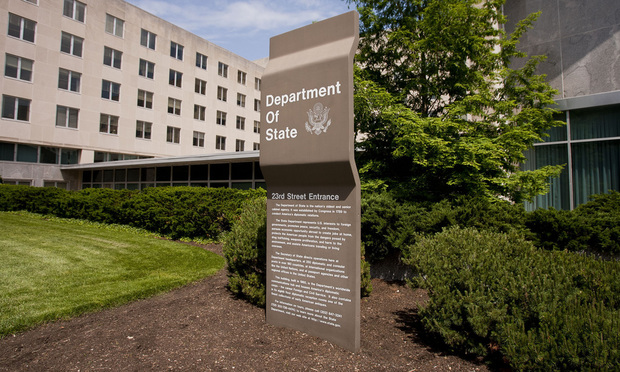NJ Court Affirms Immunity for Israeli Judges in Child Custody Dispute
A three-judge Appellate Division panel, in a published ruling released on Monday, said the plaintiff, Sharon Ben-Haim, of Englewood, cannot sue the Israeli court because the U.S. State Department conferred conduct-based immunity on foreign governmental institutions acting within their official capacities.
February 06, 2018 at 04:33 PM
3 minute read

A New Jersey appeals court has ruled that a Bergen County man, whose wife obtained a divorce in their native Israel, cannot pursue a lawsuit against the Rabbinical Religious Courts Administration of Israel and its judges over granting custody of their child to his ex-wife.
A three-judge Appellate Division panel, in a published ruling released on Monday, said plaintiff Sharon Ben-Haim of Englewood cannot sue the Israeli court because the U.S. State Department conferred conduct-based immunity on foreign governmental institutions acting within their official capacities.
The State Department had issued a “suggestion of immunity” statement for Israel's Rabbinical Courts, wrote Appellate Division Judge Robert Gilson, joined by Judges Susan Reisner and Jessica Mayer.
“We hold that New Jersey courts are bound by an SOI when, as here, the State Department's determination of conduct-based immunity is premised on the officials acting within the scope of their duties for a foreign sovereign nation,” Gilson said.
According to the court, Ben-Haim and his now-ex-wife, Oshrat, are both Israeli citizens who were married in Israel in 2008, but who lived in Englewood. They have daughter, who was born in 2009.
The family visited Israel in March 2010, when Oshrat filed for divorce in a rabbinical court. In Israel, rabbinical courts have dual jurisdiction with secular family courts over issues involving child custody support and division of property, the decision noted.
The rabbinical court issued an order prohibiting Ben-Haim from leaving Israel until the divorce proceedings were concluded. That order eventually was lifted, and Ben-Haim eventually returned to New Jersey, according to the decision.
After protracted litigation, the Israeli Supreme Court held that while Ben-Haim should have custody of his daughter, the girl could remain with Oshrat because Ben-Haim voluntarily returned to New Jersey alone.
Afterward, the rabbinical court ruled that since Ben-Haim did not agree to a divorce under Jewish doctrine, known as a “get,” he was subject to sanctions. Under that rabbinical court ruling, Ben-Haim was considered a criminal, and other Jews were forbidden to deal with him, the Appellate Division said. That ruling was published on public websites, the decision noted.
In 2015, Ben-Haim sued the rabbinical court in Bergen County, alleging that the court and its judges aided in allowing Oshrat to kidnap his daughter, and defamed him with its ruling.
Both the Israeli government and the State Department moved to dismiss the lawsuit based on the Foreign Sovereign Immunities Act. A trial judge agreed and dismissed the lawsuit, relying on the State Department's SOI designation.
On Ben-Haim's appeal, Gilson said the issue was a case of first impression for New Jersey courts.
“The United States Constitution vests the power to regulate relationships with foreign nations to the executive and legislative branches of the federal government,” he said. “Historically, the executive branch of the federal government has defined the principles governing a foreign state's immunity from lawsuits in the United States.
“The Law Division correctly accepted the SOI as binding,” Gilson said. “It has long been established that if the State Department determines that foreign officials are entitled to immunity, that decision is binding on the courts.”
Ben-Haim's attorney, Marlboro solo Saul Roffe, declined to comment.
The Israeli rabbinical court retained Robert Reeves Anderson, of the Denver office of Arnold & Porter Kaye Scholer. He did not return a call seeking comment.
This content has been archived. It is available through our partners, LexisNexis® and Bloomberg Law.
To view this content, please continue to their sites.
Not a Lexis Subscriber?
Subscribe Now
Not a Bloomberg Law Subscriber?
Subscribe Now
NOT FOR REPRINT
© 2025 ALM Global, LLC, All Rights Reserved. Request academic re-use from www.copyright.com. All other uses, submit a request to [email protected]. For more information visit Asset & Logo Licensing.
You Might Like
View All

Engine Manufacturer Escapes Suit Over NJ Helicopter Crash That Killed Country Music Star
3 minute read
Lack of Jurisdiction Dooms Child Sex Abuse Claim Against Archdiocese of Philadelphia, Says NJ Supreme Court
5 minute read
Trending Stories
- 1Rejuvenation of a Sharp Employer Non-Compete Tool: Delaware Supreme Court Reinvigorates the Employee Choice Doctrine
- 2Mastering Litigation in New York’s Commercial Division Part V, Leave It to the Experts: Expert Discovery in the New York Commercial Division
- 3GOP-Led SEC Tightens Control Over Enforcement Investigations, Lawyers Say
- 4Transgender Care Fight Targets More Adults as Georgia, Other States Weigh Laws
- 5Roundup Special Master's Report Recommends Lead Counsel Get $0 in Common Benefit Fees
Who Got The Work
J. Brugh Lower of Gibbons has entered an appearance for industrial equipment supplier Devco Corporation in a pending trademark infringement lawsuit. The suit, accusing the defendant of selling knock-off Graco products, was filed Dec. 18 in New Jersey District Court by Rivkin Radler on behalf of Graco Inc. and Graco Minnesota. The case, assigned to U.S. District Judge Zahid N. Quraishi, is 3:24-cv-11294, Graco Inc. et al v. Devco Corporation.
Who Got The Work
Rebecca Maller-Stein and Kent A. Yalowitz of Arnold & Porter Kaye Scholer have entered their appearances for Hanaco Venture Capital and its executives, Lior Prosor and David Frankel, in a pending securities lawsuit. The action, filed on Dec. 24 in New York Southern District Court by Zell, Aron & Co. on behalf of Goldeneye Advisors, accuses the defendants of negligently and fraudulently managing the plaintiff's $1 million investment. The case, assigned to U.S. District Judge Vernon S. Broderick, is 1:24-cv-09918, Goldeneye Advisors, LLC v. Hanaco Venture Capital, Ltd. et al.
Who Got The Work
Attorneys from A&O Shearman has stepped in as defense counsel for Toronto-Dominion Bank and other defendants in a pending securities class action. The suit, filed Dec. 11 in New York Southern District Court by Bleichmar Fonti & Auld, accuses the defendants of concealing the bank's 'pervasive' deficiencies in regards to its compliance with the Bank Secrecy Act and the quality of its anti-money laundering controls. The case, assigned to U.S. District Judge Arun Subramanian, is 1:24-cv-09445, Gonzalez v. The Toronto-Dominion Bank et al.
Who Got The Work
Crown Castle International, a Pennsylvania company providing shared communications infrastructure, has turned to Luke D. Wolf of Gordon Rees Scully Mansukhani to fend off a pending breach-of-contract lawsuit. The court action, filed Nov. 25 in Michigan Eastern District Court by Hooper Hathaway PC on behalf of The Town Residences LLC, accuses Crown Castle of failing to transfer approximately $30,000 in utility payments from T-Mobile in breach of a roof-top lease and assignment agreement. The case, assigned to U.S. District Judge Susan K. Declercq, is 2:24-cv-13131, The Town Residences LLC v. T-Mobile US, Inc. et al.
Who Got The Work
Wilfred P. Coronato and Daniel M. Schwartz of McCarter & English have stepped in as defense counsel to Electrolux Home Products Inc. in a pending product liability lawsuit. The court action, filed Nov. 26 in New York Eastern District Court by Poulos Lopiccolo PC and Nagel Rice LLP on behalf of David Stern, alleges that the defendant's refrigerators’ drawers and shelving repeatedly break and fall apart within months after purchase. The case, assigned to U.S. District Judge Joan M. Azrack, is 2:24-cv-08204, Stern v. Electrolux Home Products, Inc.
Featured Firms
Law Offices of Gary Martin Hays & Associates, P.C.
(470) 294-1674
Law Offices of Mark E. Salomone
(857) 444-6468
Smith & Hassler
(713) 739-1250






